AWM137 2/1 - Historical information and general development of the RAAF Nursing Service - Notes of History of the RAAF Nursing Service 1940-1944 - Part 2
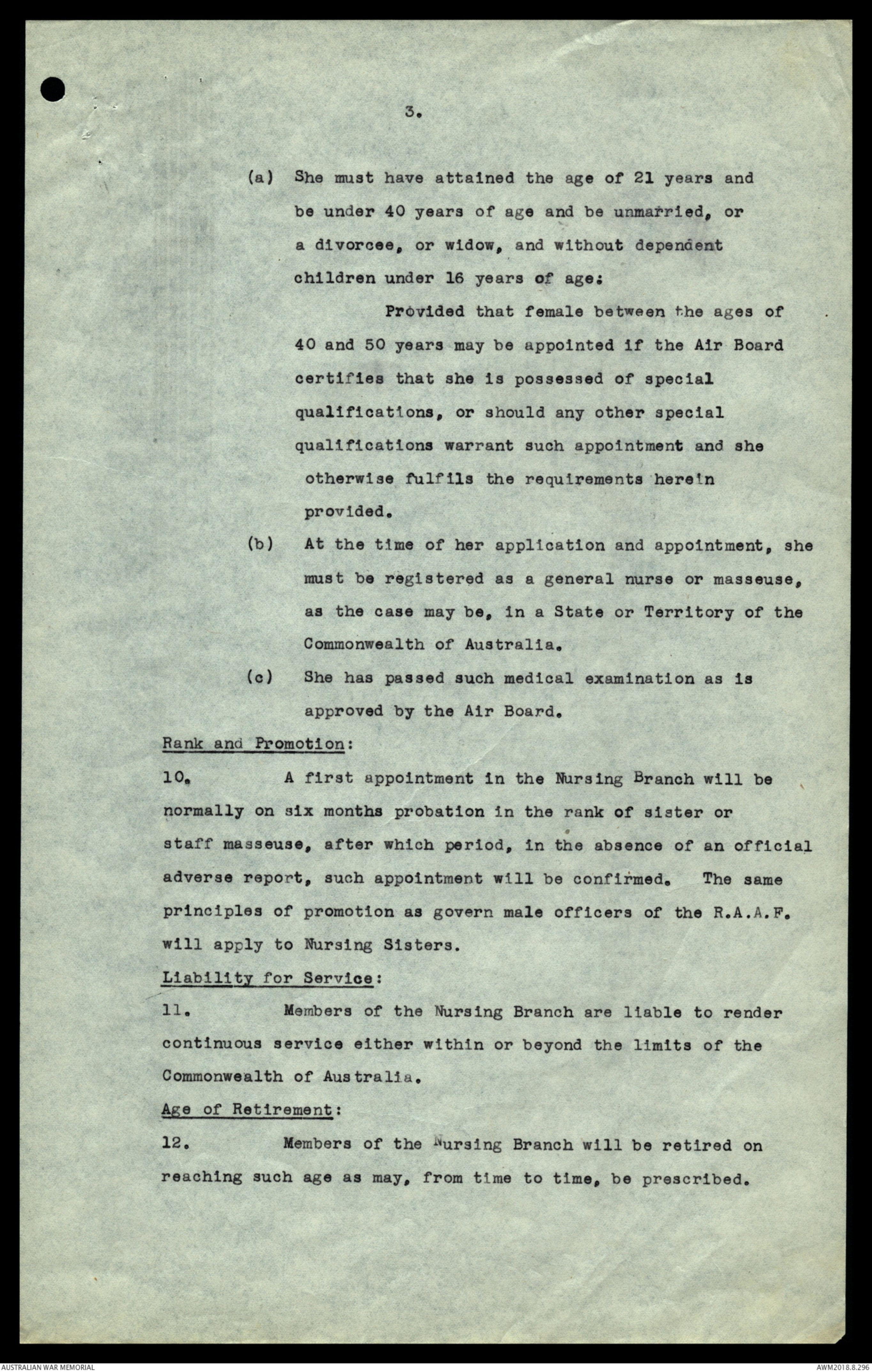
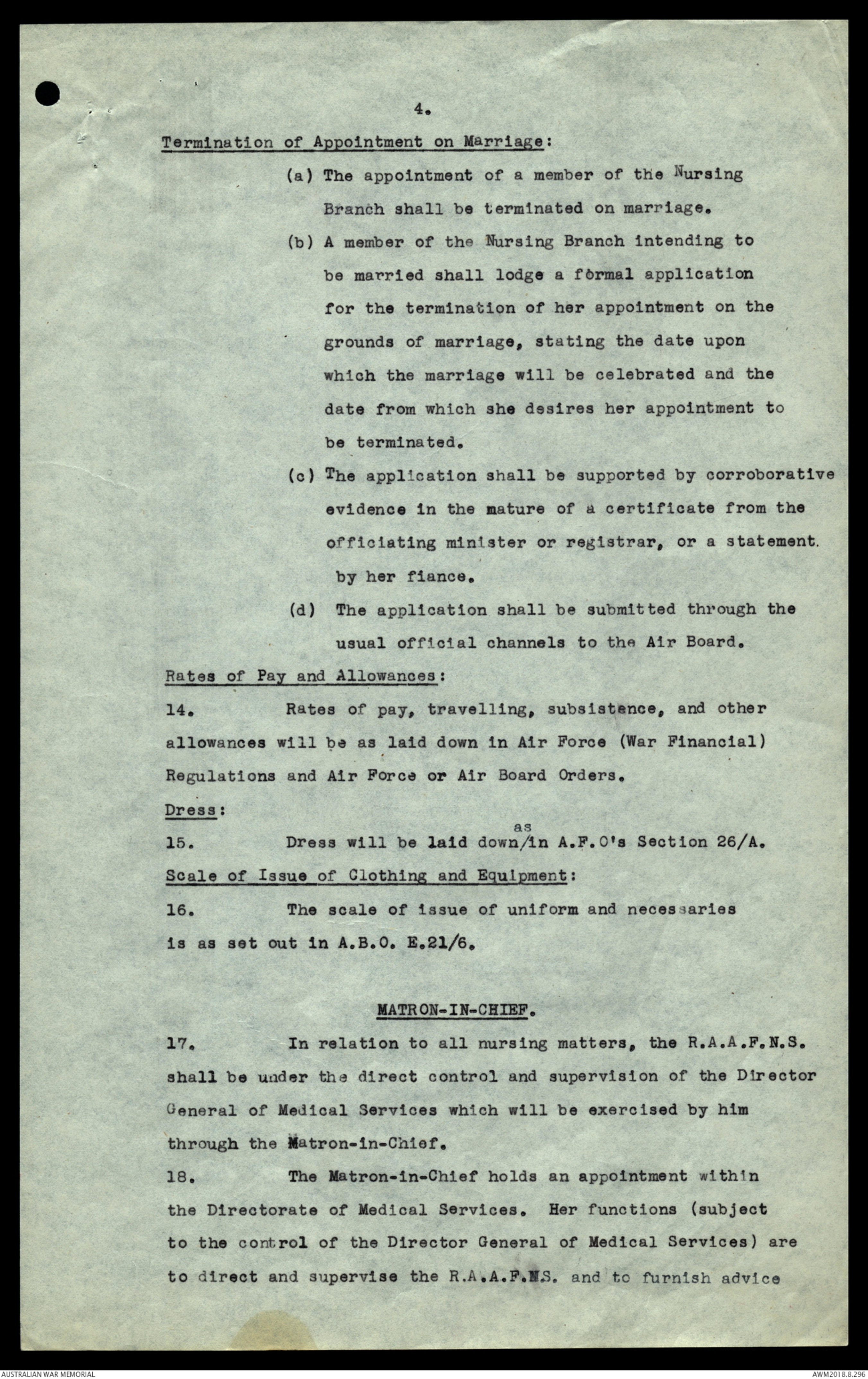
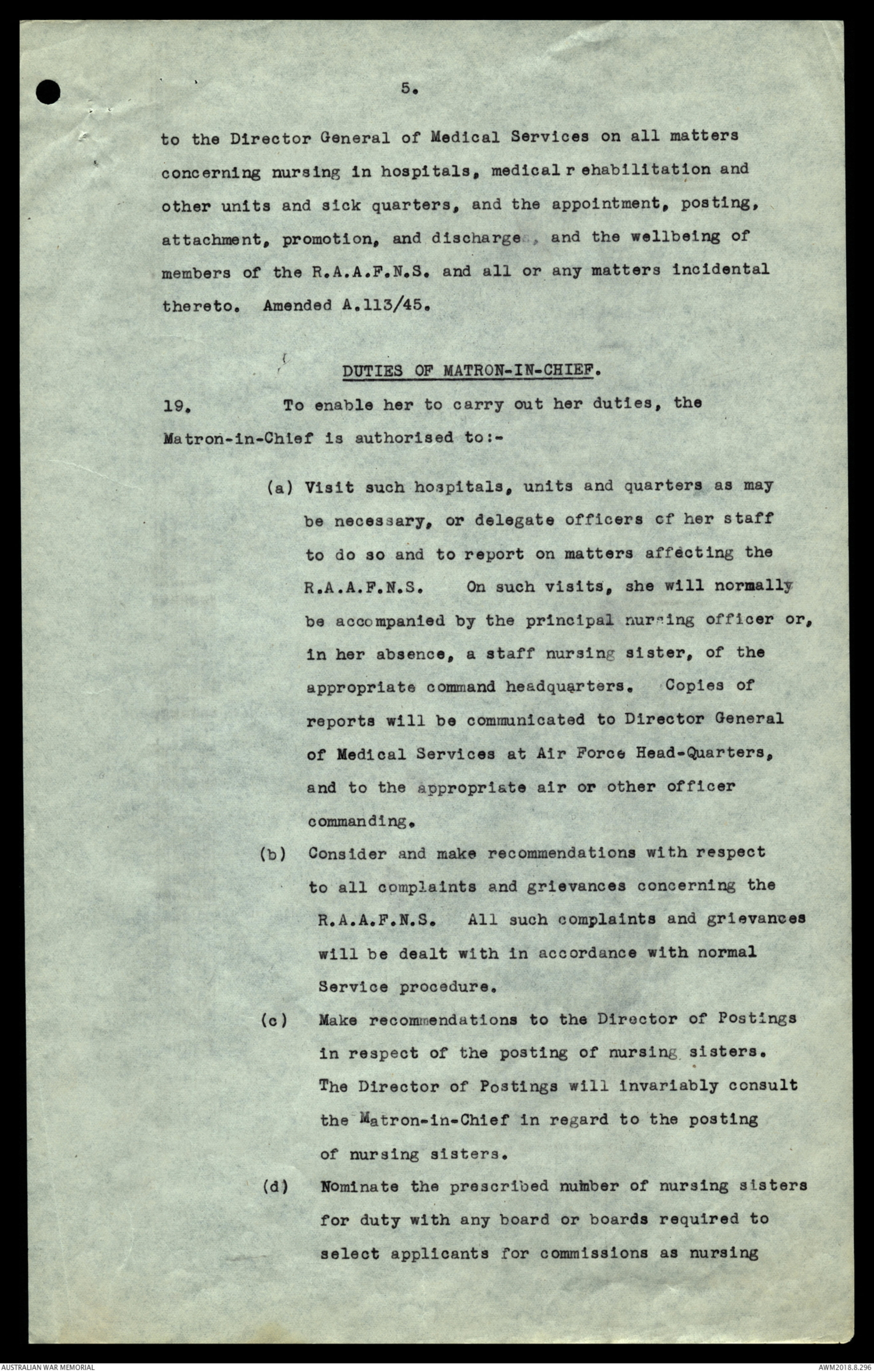
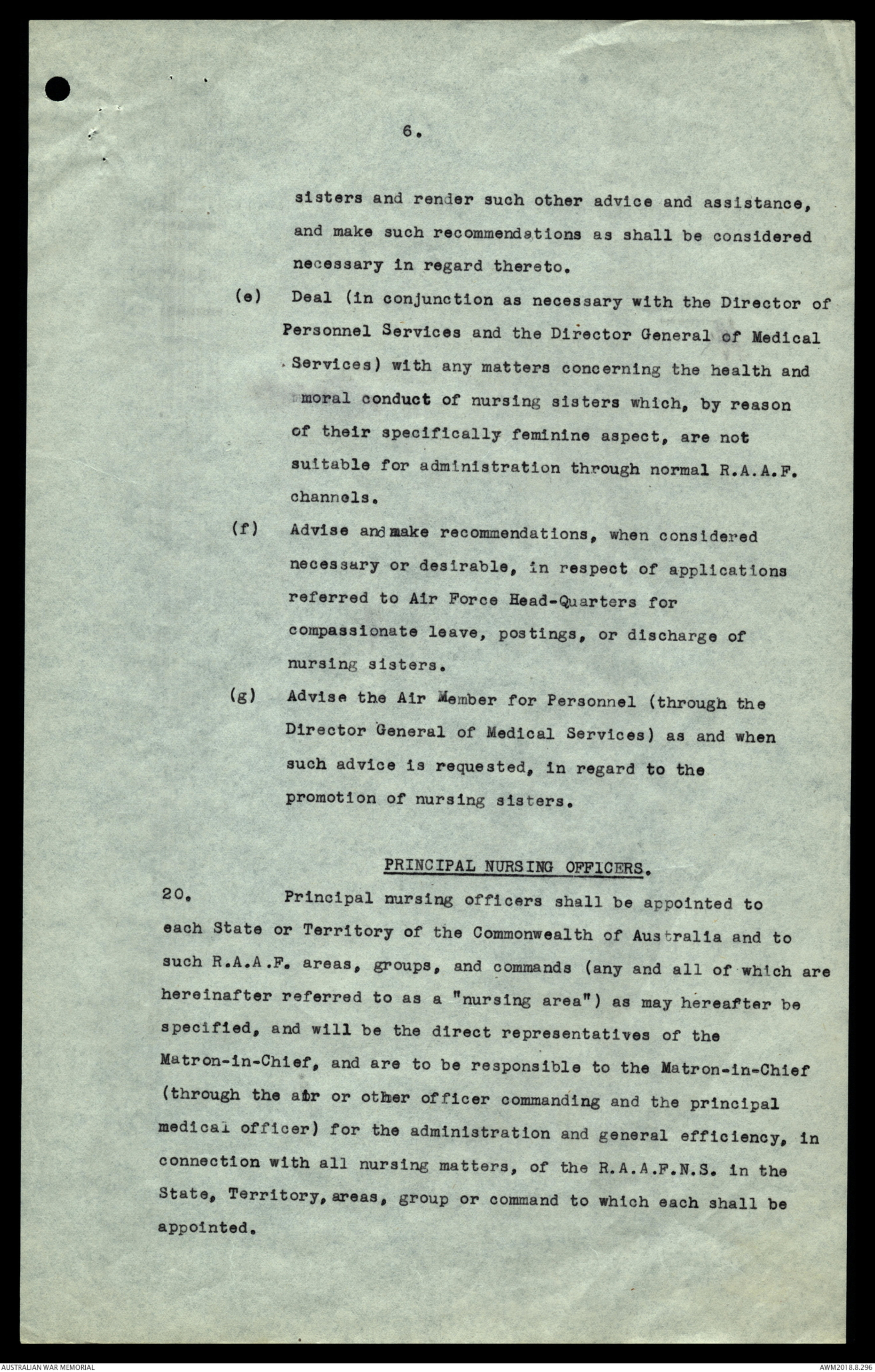
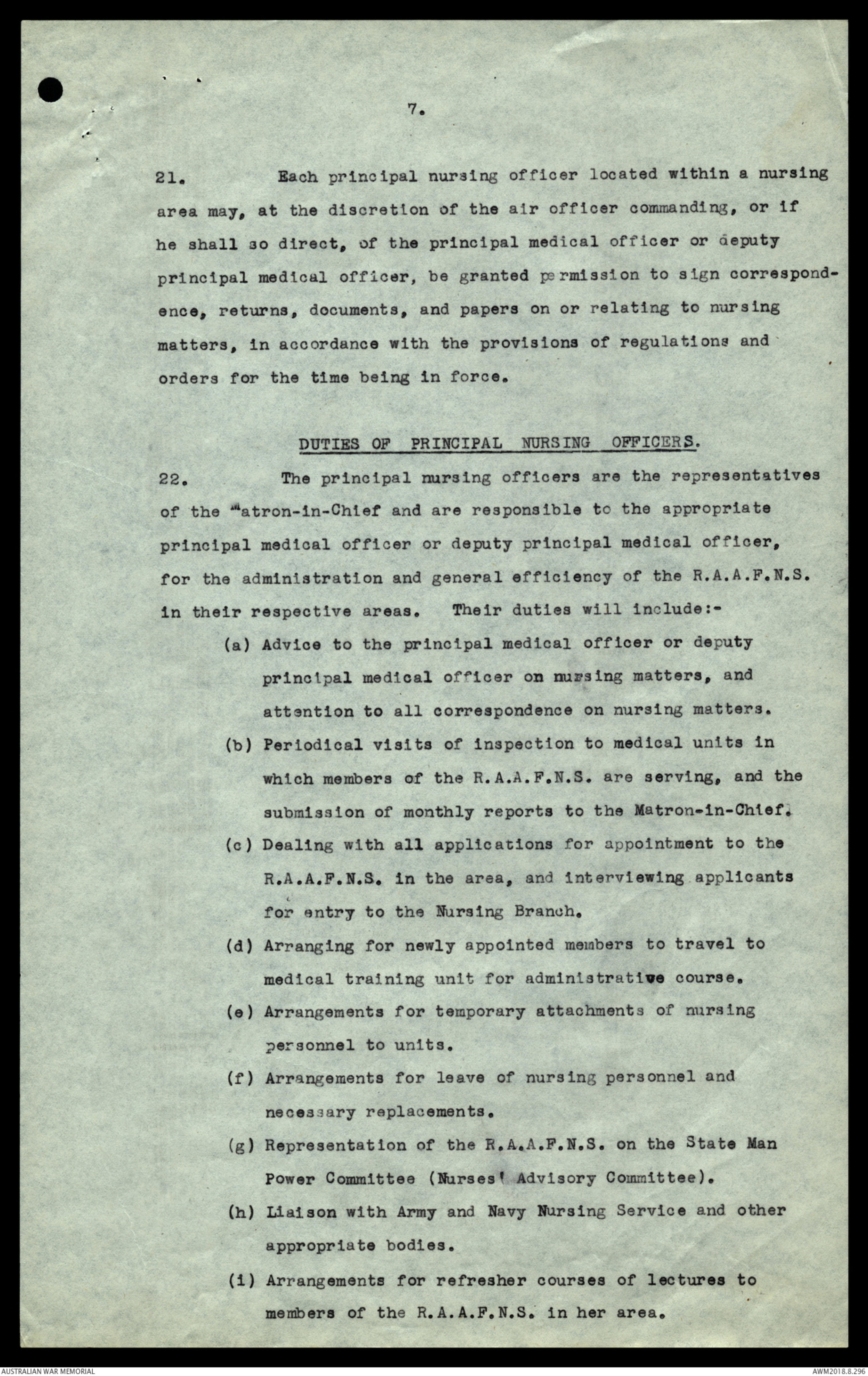
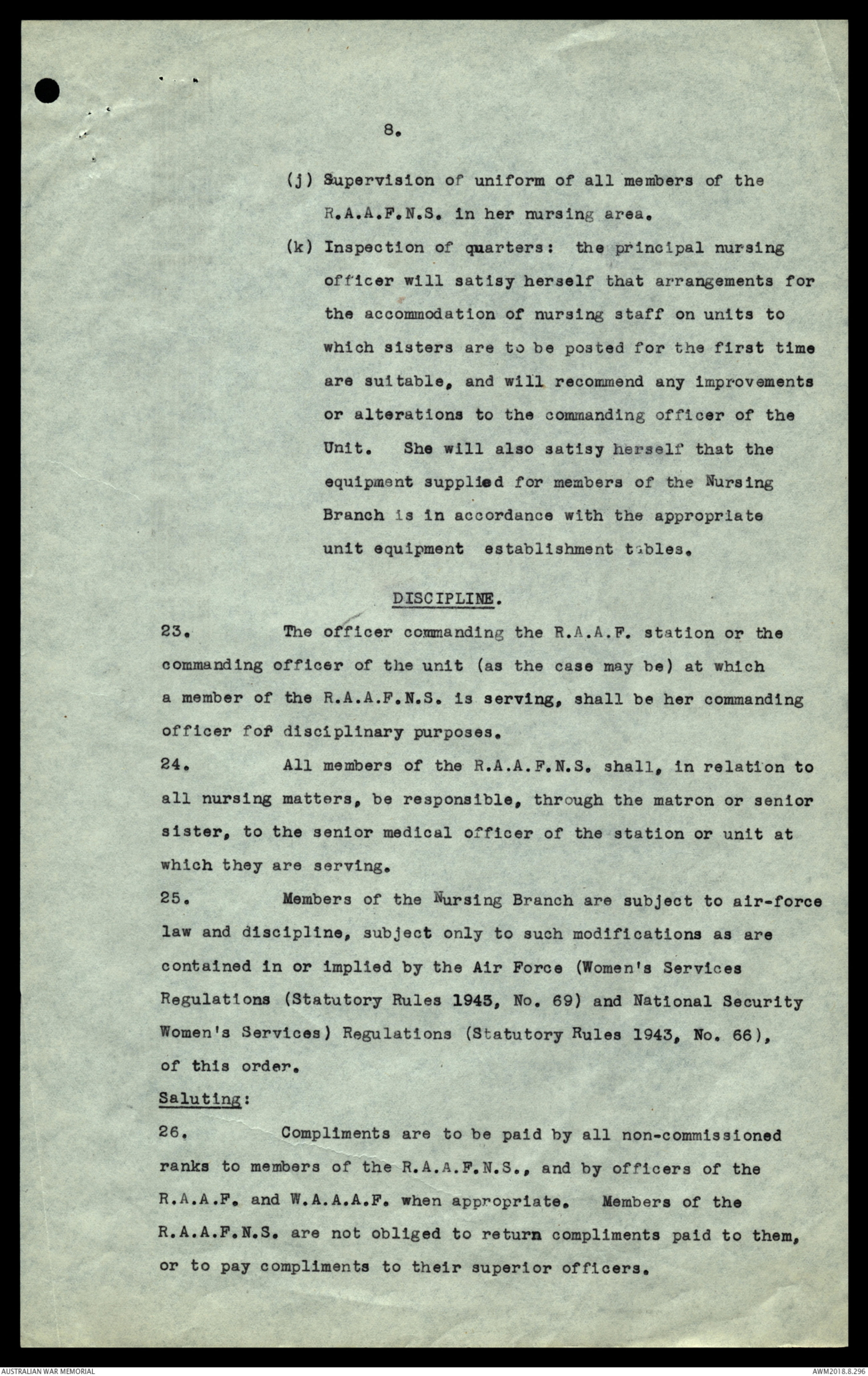
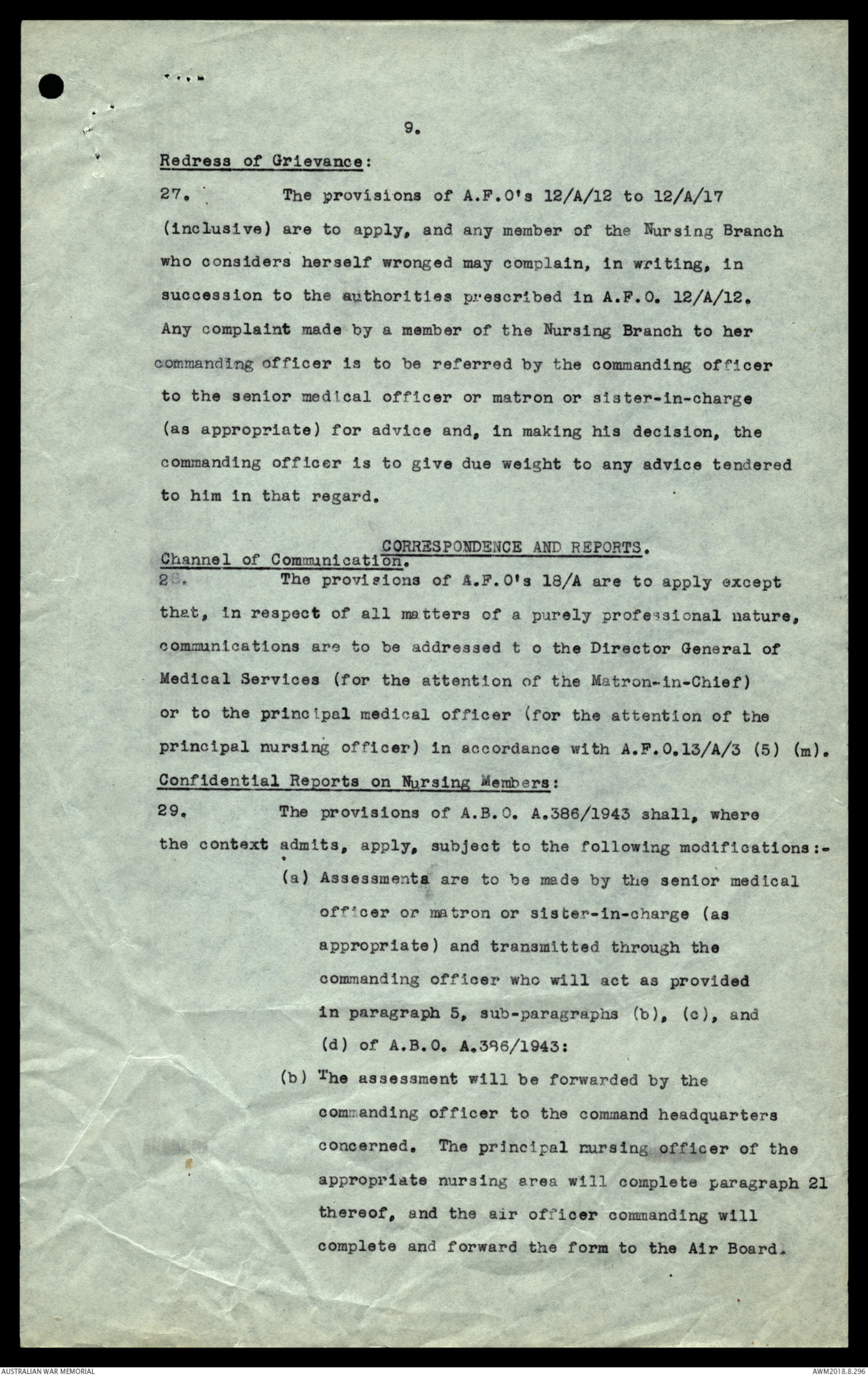
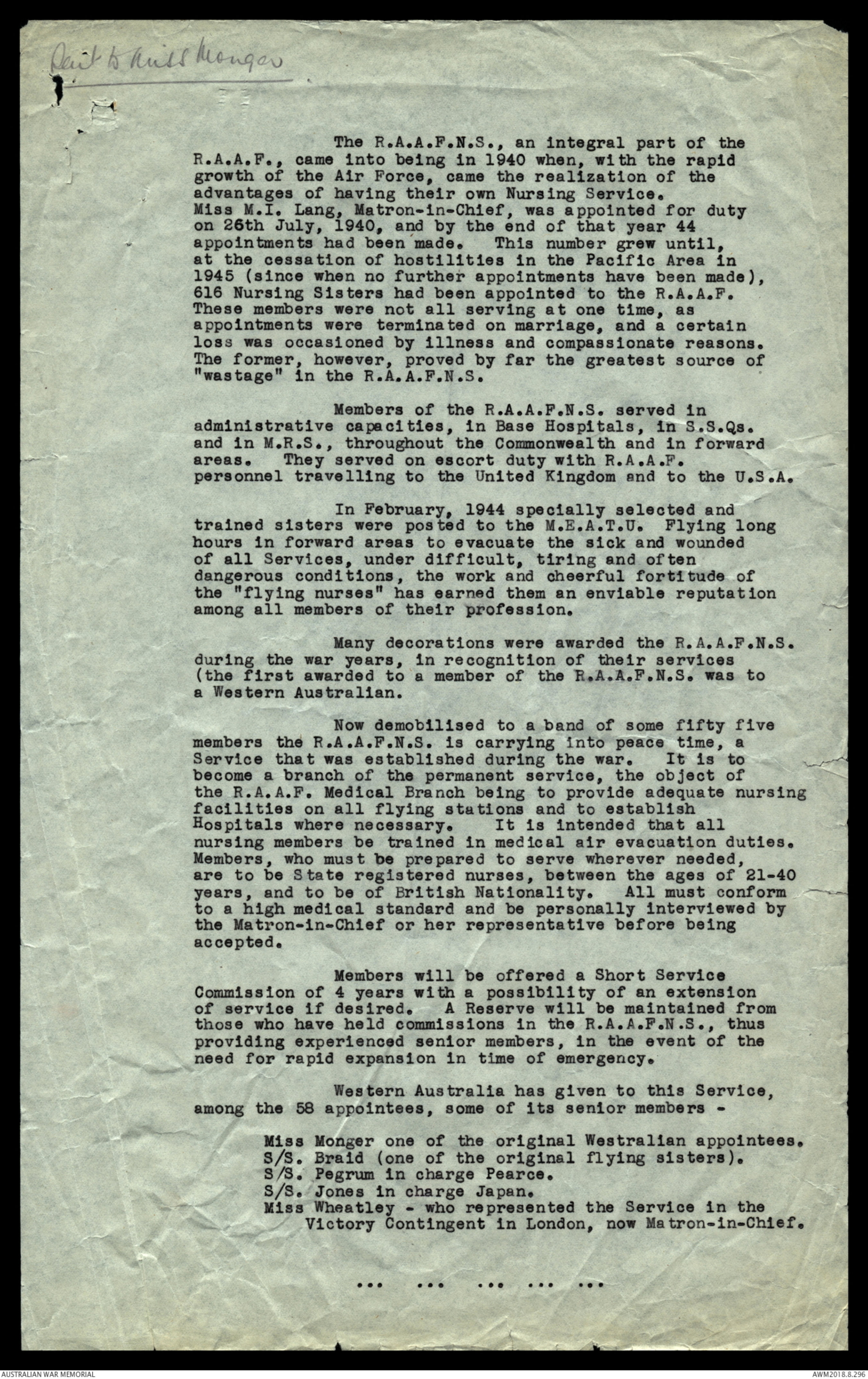
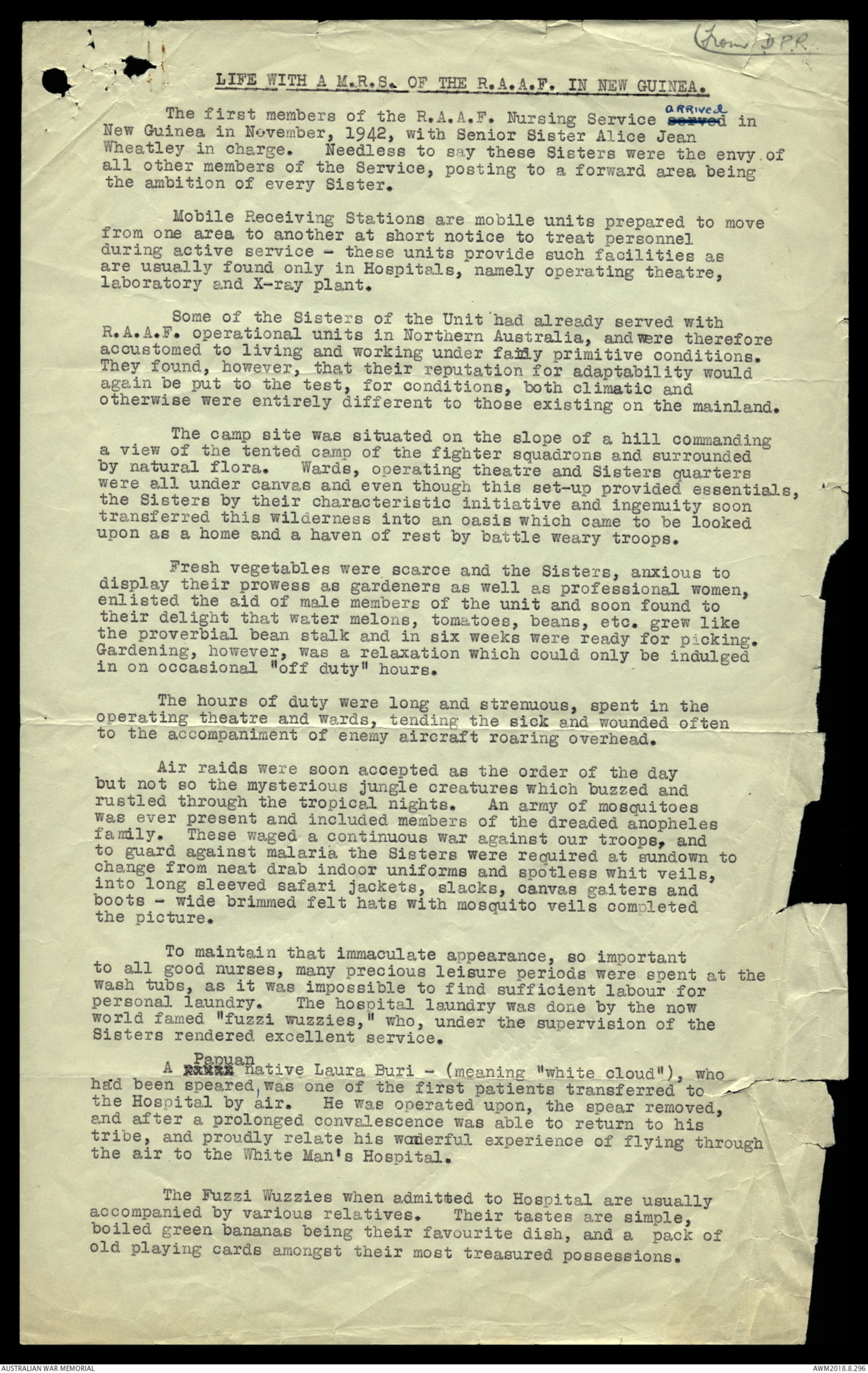
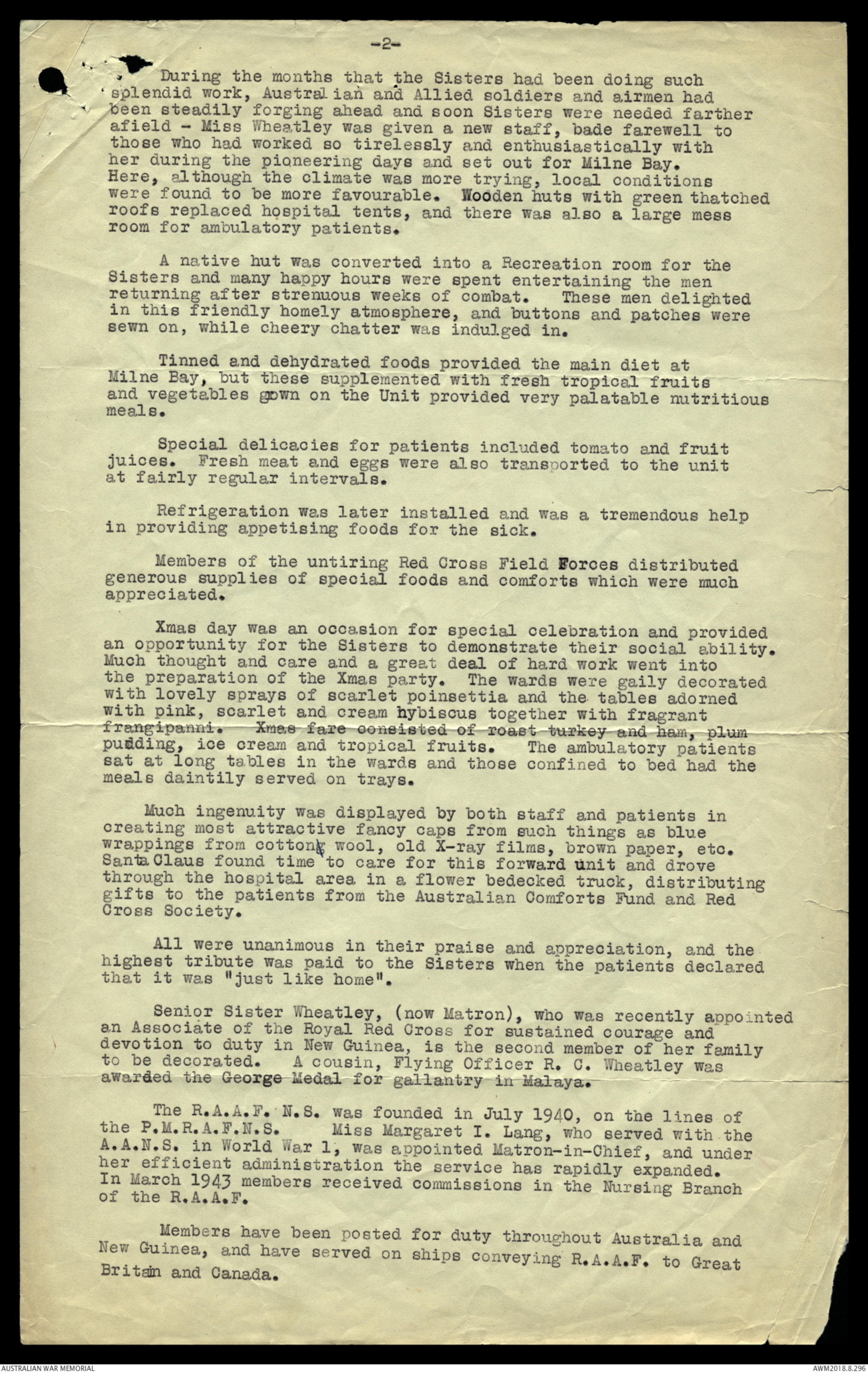
3.
(a) She must have attained the age of 21 years and
be under 40 years of age and be unmarried, or
a divorcee, or widow, and without dependent
children under 16 years of age:
Provided that female between the ages of
40 and 50 years may be appointed if the Air Board
certifies that she is possessed of special
qualifications, or should any other special
qualifications warrant such appointment and she
otherwise fulfils the requirements herein
provided.
(b) At the time of her application and appointment, she
must be registered as a general nurse or masseuse,
as the case may be, in a State or Territory of the
Commonwealth of Australia.
(c) She has passed such medical examination as is
approved by the Air Board.
Rank and Promotion:
10. A first appointment in the Nursing Branch will be
normally on six months probation in the rank of sister or
staff masseuse, after which period, in the absence of an official
adverse report, such appointment will be confirmed. The same
principles of promotion as govern male officers of the R.A.A.F.
will apply to Nursing Sisters.
Liability for Service:
11. Members of the Nursing Branch are liable to render
continuous service either within or beyond the limits of the
Commonwealth of Australia.
Age of Retirement:
12. Members of the Nursing Branch will be retired on
reaching such age as may, from time to time, be prescribed.
4.
Termination of Appointment on Marriage:
(a) The appointment of a member of the Nursing
Branch shall be terminated on marriage.
(b) A member of the Nursing Branch intending to
be married shall lodge a formal application
for the termination of her appointment on the
grounds of marriage, stating the date upon
which the marriage will be celebrated and the
date from which she desires her appointment to
be terminated.
(c) The application shall be supported by corroborative
evidence in the nature of a certificate from the
officiating minister or registrar, or a statement.
by her fiance.
(d) The application shall be submitted through the
usual official channels to the Air Board.
Rates of Pay and Allowances:
14. Rates of pay, travelling, subsistence, and other
allowances will be as laid down in Air Force (War Financial)
Regulations and Air Force or Air Board Orders.
Dress:
15. Dress will be laid down ^as in A.F.O's Section 26/A.
Scale of Issue of Clothing and Equipment:
16. The scale of issue of uniform and necessaries
is as set out in A.B.O. E.21/6.
MATRON-IN-CHIEF
17. In relation to all nursing matters, the R.A.A.F.N.S.
shall be under the direct control and supervision of the Director
General of Medical Services which will be exercised by him
through the Matron-in-Chief.
18. The Matron-in-Chief holds an appointment within
the Directorate of Medical Services. Her functions (subject
to the control of the Director General of Medical Services) are
to direct and supervise the R.A.A.F.N.S. and to furnish advice
5.
to the Director General of Medical Services on all matters
concerning nursing in hospitals, medical rehabilitation and
other units and sick quarters, and the appointment, posting,
attachment, promotion, and discharge, and the wellbeing of
members of the R.A.A.F.N.S. and all or any matters incidental
thereto. Amended A.113/45.
DUTIES OF MATRON-IN-CHIEF.
19. To enable her to carry out her duties, the
Matron-in-Chief is authorised to:-
(a) Visit such hospitals, units and quarters as may
be necessary, or delegate officers of her staff
to do so and to report on matters affecting the
R.A.A.F.N.S. On such visits, she will normally
be accompanied by the principal nursing officer or,
in her absence, a staff nursing sister, of the
appropriate command headquarters. Copies of
reports will be communicated to Director General
of Medical Services at Air Force Head-Quarters,
and to the appropriate air or other officer
commanding.
(b) Consider and make recommendations with respect
to all complaints and grievances concerning the
R.A.A.F.N.S. All such complaints and grievances
will be dealt with in accordance with normal
Service procedure.
(c) Make recommendations to the Director of Postings
in respect of the posting of nursing sisters.
The Director of Postings will invariably consult
the Matron-in-Chief in regard to the posting
of nursing sisters.
(d) Nominate the prescribed number of nursing sisters
for duty with any board or boards required to
select applicants for commissions as nursing
6.
sisters and render such other advice and assistance,
and make such recommendations as shall be considered
necessary in regard thereto.
(e) Dea l(in conjunction as necessary with the Director of
Personnel Services and the Director General of Medical
Services) with any matters concerning the health and
moral conduct of nursing sisters which, by reason
of their specifically feminine aspect, are not
suitable for administration through normal R.A.A.F.
channels.
(f) Advise and make recommendations, when considered
necessary or desirable, in respect of applications
referred to Air Force Head-Quarters for
compassionate leave, postings, or discharge of
nursing sisters.
(g) Advise the Air Member for Personnel (through the
Director General of Medical Services) as and when
such advice is requested, in regard to the
promotion of nursing sisters.
PRINCIPAL NURSING OFFICERS.
20. Principal nursing officers shall be appointed to
each State or Territory of the Commonwealth of Australia and to
such R.A.A.F. areas, groups, and commands (any and all of which are
hereinafter referred to as a "nursing area") as may hereafter be
specified, and will be the direct representatives of the
Matron-in-Chief, and are to be responsible to the Matron-in-Chief
(through the air or other officer commanding and the principal
medical officer) for the administration and general efficiency, in
connection with all nursing matters, of the R.A.A.F.N.S. in the
State, Territory, areas, group or command to which each shall be
appointed.
7.
21. Each principal nursing officer located within a nursing
area may, at the discretion of the air officer commanding, or if
he shall so direct, of the principal medical officer or deputy
principal medical officer, be granted permission to sign correspondence,
returns, documents, and papers on or relating to nursing
matters, in accordance with the provisions of regulations and
orders for the time being in force.
DUTIES OF PRINCIPAL NURSING OFFICERS.
22. The principal nursing officers are the representatives
of the Matron-in-Chief and are responsible to the appropriate
principal medical officer or deputy principal medical officer,
for the administration and general efficiency of the R.A.A.F.N.S.
in their respective areas. Their duties will include:-
(a) Advice to the principal medical officer or deputy
principal medical officer on nursing matters, and
attention to all correspondence on nursing matters.
(b) Periodical visits of inspection to medical units in
which members of the R.A.A.F.N.S. are serving, and the
submission of monthly reports to the Matron-in-Chief.
(c) Dealing with all applications for appointment to the
R.A.A.F.N.S. in the area, and interviewing applicants
for entry to the Nursing Branch.
(d) Arranging for newly appointed members to travel to
medical training unit for administrative course.
(e) Arrangements for temporary attachments of nursing
personnel to units.
(f) Arrangements for leave of nursing personnel and
necessary replacements.
(g) Representation of the R.A.A.F.N.S. on the State Man
Power Committee (Nurses Advisory Committee).
(h) Liaison with Army and Navy Nursing Service and other
appropriate bodies.
(i) Arrangements for refresher courses of lectures to
members of the R.A.A.F.N.S. in her area.
8.
(j) Supervision of uniform of all members of the
R.A.A.F.N.S. in her nursing area.
(k) Inspection of quarters: the principal nursing
officer will satisy herself that arrangements for
the accommodation of nursing staff on units to
which sisters are to be posted for the first time
are suitable, and will recommend any improvements
or alterations to the commanding officer of the
Unit. She will also satisy herself that the
equipment supplied for members of the Nursing
Branch is in accordance with the appropriate
unit equipment establishment tables.
DISCIPLINE.
23. The officer commanding the R.A.A.F. station or the
commanding officer of the unit (as the case may be) at which
a member of the R.A.A.F.N.S. is serving, shall be her commanding
officer for disciplinary purposes.
24. All members of the R.A.A.F.N.S. shall, in relation to
all nursing matters, be responsible, through the matron or senior
sister, to the senior medical officer of the station or unit at
which they are serving.
25. Members of the Nursing Branch are subject to air-force
law and discipline, subject only to such modifications as are
contained in or implied by the Air Force (Women's Services
Regulations (Statutory Rules 1943, No. 69) and National Security
Women's Services) Regulations (Statutory Rules 1943, No. 66),
of this order.
Saluting:
26. Compliments are to be paid by all non-commissioned
ranks to members of the R.A.A.F.N.S., and by officers of the
R.A.A.F. and W.A.A.A.F. when appropriate. Members of the
R.A.A.F.N.S. are not obliged to return compliments paid to them,
or to pay compliments to their superior officers.
9.
Redress of Grievance:
27. The provisions of A.F.O's 12/A/12 to 12/A/17
(inclusive) are to apply, and any member of the Nursing Branch
who considers herself wronged may complain, in writing, in
succession to the authorities prescribed in A.F.O. 12/A/12.
Any complaint made by a member of the Nursing Branch to her
commanding officer is to be referred by the commanding officer
to the senior medical officer or matron or sister-in-charge
(as appropriate) for advice and, in making his decision, the
commanding officer is to give due weight to any advice tendered
to him in that regard.
CORRESPONDENCE AND REPORTS.
Channel of Communication.
28. The provisions of A.F.O's 18/A are to apply except
that, in respect of all matters of a purely professional nature,
communications are to be addressed to the Director General of
Medical Services (for the attention of the Matron-in-Chief)
or to the principal medical officer (for the attention of the
principal nursing officer) in accordance with A.F.O.13/A/3 (5) (m).
Confidential Reports on Nursing Members:
29. The provisions of A.B.O. A.386/1943 shall, where
the context admits, apply, subject to the following modifications:-
(a) Assessments are to be made by the senior medical
officer or matron or sister-in-charge (as
appropriate) and transmitted through the
commanding officer who will act as provided
in paragraph 5, sub-paragraphs (b), (c), and
(d) of A.B.O. A.386/1943:
(b) The assessment will be forwarded by the
commanding officer to the command headquarters
concerned. The principal nursing officer of the
appropriate nursing area will complete paragraph 21
thereof, and the air officer commanding will
complete and forward the form to the Air Board.
[*Sent to Miss Monger*]
The R.A.A.F.N.S., an integral part of the
R.A.A.F., came into being in 1940 when, with the rapid
growth of the Air Force, came the realization of the
advantages of having their own Nursing Service.
Miss M.I. Lang, Matron-in-Chief, was appointed for duty
on 26th July, 1940, and by the end of that year 44
appointments had been made. This number grew until,
at the cessation of hostilities in the Pacific Area in
1945 (since when no further appointments have been made),
616 Nursing Sisters had been appointed to the R.A.A.F.
These members were not all serving at one time, as
appointments were terminated on marriage, and a certain
loss was occasioned by illness and compassionate reasons.
The former, however, proved by far the greatest source of
"wastage" in the R.A.A.F.N.S.
Members of the R.A.A.F.N.S. served in
administrative capacities, in Base Hospitals, in S.S.Qs.
and in M.R.S., throughout the Commonwealth and in forward
areas. They served on escort duty with R.A.A.F.
personnel travelling to the United Kingdom and to the U.S.A.
In February, 1944 specially selected and
trained sisters were posted to the M.E.A.T.U. Flying long
hours in forward areas to evacuate the sick and wounded
of all Services, under difficult, tiring and often
dangerous conditions, the work and cheerful fortitude of
the "flying nurses" has earned them an enviable reputation
among all members of their profession.
Many decorations were awarded the R.A.A.F.N.S.
during the war years, in recognition of their services
(the first awarded to a member of the R.A.A.F.N.S. was to
a Western Australian.
Now demobilised to a band of some fifty five
members the R.A.A.F.N.S. is carrying into peace time, a
Service that was established during the war. It is to
become a branch of the permanent service, the object of
the R.A.A.F. Medical Branch being to provide adequate nursing
facilities on all flying stations and to establish
Hospitals where necessary. It is intended that all
nursing members be trained in medical air evacuation duties.
Members, who must be prepared to serve wherever needed,
are to be State registered nurses, between the ages of 21-40
years, and to be of British Nationality. All must conform
to a high medical standard and be personally interviewed by
the Matron-in-Chief or her representative before being
accepted.
Members will be offered a Short Service
Commission of 4 years with a possibility of an extension
of service if desired. A Reserve will be maintained from
those who have held commissions in the R.A.A.F.N.S., thus
providing experienced senior members, in the event of the
need for rapid expansion in time of emergency.
Western Australia has given to this Service,
among the 58 appointees, some of its senior members -
Miss Monger one of the original Westralian appointees.
S/S. Braid (one of the original flying sisters).
S/S. Pegrum in charge Pearce.
S/S. Jones in charge Japan.
Miss Wheatley - who represented the Service in the
Victory Contingent in London, now Matron-in-Chief.
[*From D.P.R.*]
LIFE WITH A M.R.S. OF THE R.A.A.F. IN NEW GUINEA.
The first members of the R.A.A.F. Nursing Service served arrived in
New Guinea in November, 1942, with Senior Sister Alice Jean
Wheatley in charge. Needless to say these Sisters were the envy of
all other members of the Service, posting to a forward area being
the ambition of every Sister.
Mobile Receiving Stations are mobile units prepared to move
from one area to another at short notice to treat personnel
during active service - these units provide such facilities as
are usually found only in Hospitals, namely operating theatre,
laboratory and X-ray plant.
Some of the Sisters of the Unit had already served with
R.A.A.F. operational units in Northern Australia, and were therefore
accustomed to living and working under fairly primitive conditions.
They found, however, that their reputation for adaptability would
again be put to the test, for conditions, both climatic and
otherwise were entirely different to those existing on the mainland.
The camp site was situated on the slope of a hill commanding
a view of the tented camp of the fighter squadrons and surrounded
by natural flora. Wards, operating theatre and Sisters quarters
were all under canvas and even though this set-up provided essentials,
the Sisters by their characteristic initiative and ingenuity soon
transferred this wilderness into an oasis which came to be looked
upon as a home and a haven of rest by battle weary troops.
Fresh vegetables were scarce and the Sisters, anxious to
display their prowess as gardeners as well as professional women,
enlisted the aid of male members of the unit and soon found to
their delight that water melons, tomatoes, beans, etc. grew like
the proverbial bean stalk and in six weeks were ready for picking.
Gardening, however, was a relaxation which could only be indulged
in on occasional "off duty" hours.
The hours of duty were long and strenuous, spent in the
operating theatre and wards, tending the sick and wounded often
to the accompaniment of enemy aircraft roaring overhead.
Air raids were soon accepted as the order of the day
but not so the mysterious jungle creatures which buzzed and
rustled rough the tropical nights. An army of mosquitoes
was ever present and included members of the dreaded anopheles
family. These waged a continuous war against our troops, and
to guard against malaria the Sisters were required at sundown to
change from neat drab indoor uniforms and spotless whit veils,
into long sleeved safari jackets, slacks, canvas gaiters and
boots - wide brimmed felt hats with mosquito veils completed
the picture.
To maintain that immaculate appearance, so important
to all good nurses, many precious leisure periods were spent at the
wash tubs, as it was impossible to find sufficient labour for
personal laundry. The hospital laundry was done by the now
world famed "fuzzi wuzzies," who, under the supervision of the
Sisters rendered excellent service.
A xxxxx Papuan native Laura Buri - (meaning "white cloud"), who
had been speared, was one of the first patients transferred to
the Hospital by air. He was operated upon, the spear removed,
and after a prolonged convalescence was able to return to his
tribe, and proudly relate his wonderful experience of flying through
the air to the White Man's Hospital.
The Fuzzi Wuzzies when admitted to Hospital are usually
accompanied by various relatives. Their tastes are simple,
boiled green bananas being their favourite dish, and a pack of
old playing cards amongst their most treasured possessions.
-2-
During the months that the Sisters had been doing such
splendid work, Australian and Allied soldiers and airmen had
been steadily forging ahead and soon Sisters were needed farther
afield - Miss Wheatley was given a new staff, bade farewell to
those who had worked so tirelessly and enthusiastically with
her during the pioneering days and set out for Milne Bay.
Here, although the climate was more trying, local conditions
were found to be more favourable. Wooden huts with green thatched
roofs replaced hospital tents, and there was also a large mess
room for ambulatory patients.
A native hut was converted into a Recreation room for the
Sisters and many happy hours were spent entertaining the men
returning after strenuous weeks of combat. These men delighted
in this friendly homely atmosphere, and buttons and patches were
sewn on, while cheery chatter was indulged in.
Tinned and dehydrated foods provided the main diet at
Milne Bay, but these supplemented with fresh tropical fruits
and vegetables grown on the Unit provided very palatable nutritious
meals.
Special delicacies for patients included tomato and fruit
juices. Fresh meat and eggs were also transported to the unit
at fairly regular intervals.
Refrigeration was later installed and was a tremendous help
in providing appetising foods for the sick.
Members of the untiring Red Cross Field Forces distributed
generous supplies of special foods and comforts which were much
appreciated.
Xmas day was an occasion for special celebration and provided
an opportunity for the Sisters to demonstrate their social ability.
Much thought and care and a great deal of hard work went into
the preparation of the Xmas party. The wards were gaily decorated
with lovely sprays of scarlet poinsettia and the tables adorned
with pink, scarlet and cream hybiscus together with fragrant
frangipanni. Xmas fare consisted of roast-turkey and ham, plum
pudding, ice cream and tropical fruits. The ambulatory patients
sat at long tables in the wards and those confined to bed had the
meals daintily served on trays.
Much ingenuity was displayed by both staff and patients in
creating most attractive fancy caps from such things as blue
wrappings from cottong wool, old X-ray films, brown paper, etc.
Santa Claus found time to care for this forward unit and drove
through the hospital area in a flower bedecked truck, distributing
gifts to the patients from the Australian Comforts Fund and Red
Cross Society.
All were unanimous in their praise and appreciation, and the
highest tribute was paid to the Sisters when the patients declared
that it was "just like home".
Senior Sister Wheatley, (now Matron ), who was recently appointed
an Associate of the Royal Red Cross for sustained courage and
devotion to duty in New Guinea, is the second member of her family
to be decorated. A cousin, Flying Officer R. C. Wheatley was
awarded the George Medal for gallantry in Malaya.
The R.A.A.F. N.S. was founded in July 1940, on the lines of
the P.M.R.A.F.N.S. Miss Margaret I. Lang, who served with the
A.A.N.S. in World War 1, was appointed Matron-in-Chief, and under
her efficient administration the service has rapidly expanded.
In March 1943 members received commissions in the Nursing Branch
of the R.A.A.F.
Members have been posted for duty throughout Australia and
New Guinea, and have served on ships conveying R.A.A.F. to Great
Britain and Canada.
 Sam scott
Sam scottThis transcription item is now locked to you for editing. To release the lock either Save your changes or Cancel.
This lock will be automatically released after 60 minutes of inactivity.